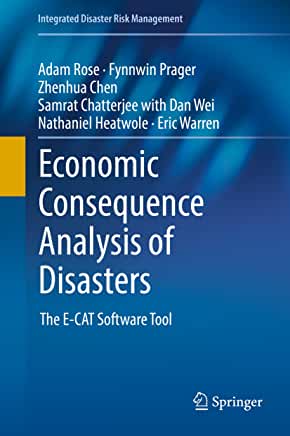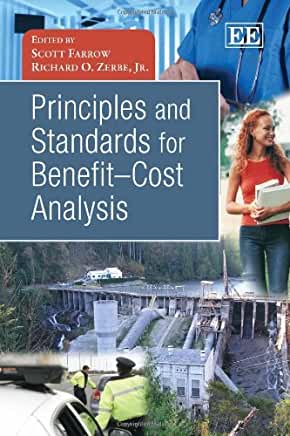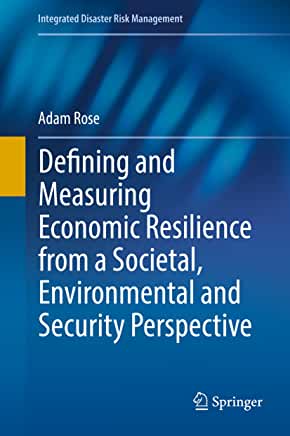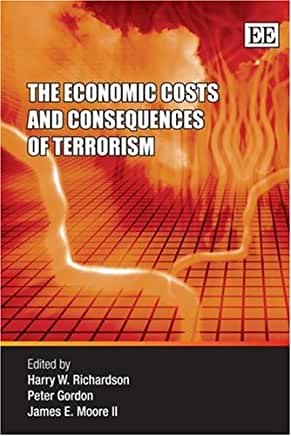





CREATE’s economic analysis researchers estimate consequences and costs of terrorism and natural hazards as well as evaluate investments in mitigation and resilience to reduce risks.
Terrorist acts can have extensive negative consequences, beginning with death and injury, property damage and business interruption. However, negative impacts can be magnified greatly by a combination of ordinary multiplier or general equilibrium effects, cascading infrastructure system failures, and behavioral responses stemming from fear. At the same time, resilience can be enhanced at all levels–individual households and businesses, markets, supply chains, and the economies of regions and the nation as a whole.
CREATE researchers empirically estimate consequences and risk reduction implementation costs. At the microeconomic level, benefit-cost and econometric analysis are refined and used for individual projects, products or markets. At the macroeconomic level, computable general equilibrium and input-output models are refined and used.
CREATE’s economic consequence framework provides a comprehensive macroeconomic evaluation of risk-based outcomes along with risk-informed social benefit-cost analysis.
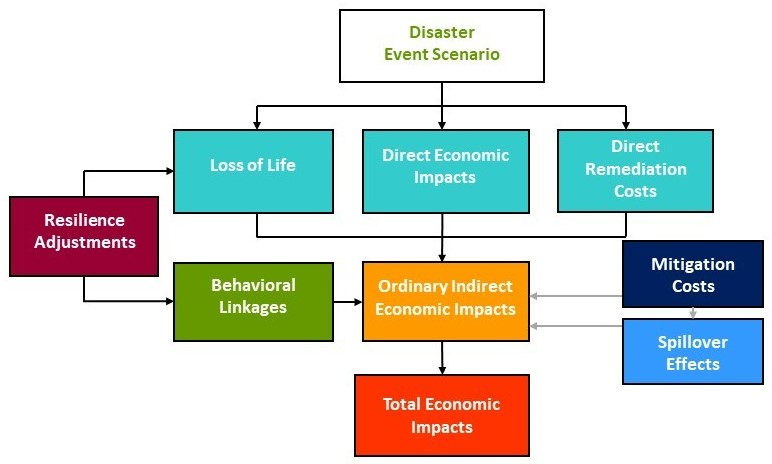

Our framework has been used for assessment across threat categories (natural hazards, bio-threats, terrorist attacks, technological accidents), and has been used in numerous studies of businesses, infrastructure service providers and homeland security agencies (e.g., cost-effectiveness of individual resilience tactics, border-crossing wait times, terrorism countermeasure spillover effects on business, electricity reliability, cyber threats, supply-chain vulnerability, location and migration decisions, post-disaster public assistance, and economic recovery).
Researchers


Adam Rose
Adam Rose is a Research Professor in the University of Southern California Sol Price School of Public Policy and a Research Fellow at CREATE. Previously, he held faculty…
Eli Berman
Eli Berman is a professor in the Department of Economics at the University of California, San Diego. He is also a research associate at the National Bureau of Economic…
Zhenhua Chen
Zhenhua is an assistant professor in City and Regional Planning (CRP) at the Knowlton School of Architecture at OSU. His research interest includes infrastructure planning and policy…
Noah Dormady
Noah Dormady teaches and conducts research in the areas of applied public policy analysis, energy policy, environmental policy, economic resilience, and terrorism and…
Peter B. Dixon
After working at the IMF and the Reserve Bank of Australia, Dixon joined the Australian government’s IMPACT Project in 1975. At IMPACT he led the team…


Jonathan Eyer
Jonathan Eyer is Research Assistant Professor in the USC Sol Price School of Public Policy, and a Research Fellow at CREATE. He received his Ph.D. in economics…


Scott Farrow
Scott Farrow is a Professor in the Department of Economics at UMBC, a branch of the University of Maryland and a Research Fellow at CREATE. Previously Dr. Farrow…
Fynnwin Prager
Fynn Prager is currently Assistant Professor of Public Administration at CSU Dominguez Hills, College of Business Administration and Public Policy…
Bryan Roberts
Bryan Roberts is a senior economist at Econometrica, Inc. He was previously a senior economist at Nathan Associates. He is also an adjunct lecturer at George Washington University’s…
Terrie Walmsley is a Visiting Professor in USC’s Economics Department and the Chief Economist at IMPACT LLC, a firm that provides global economic analysis to government…


Dan Wei
Dan Wei is Research Associate Professor in the USC Sol Price School of Public Policy, and a Research Fellow at CREATE. She has been active in research in economic…
Sample Publications
Sample Papers
- Sue Wing, I. and A. Rose. “Economic Consequence Analysis of Electric Power Infrastructure Disruptions: An Analytical General Equilibrium Approach,” Energy Economics, forthcoming.
- Wei, D., Z. Chen and A. Rose. “Evaluating the Role of Resilience in Recovering from Major Port Disruptions: A Multi-Regional Analysis,” Papers in Regional Science, forthcoming.
- Rose, A., P. Ganderton, J. Eyer, D. Wei, R. Bostic and D. von Winterfeldt. “The Design of a Deductible/Credit System for Post-Disaster Public Assistance,” Journal of Environmental Planning and Management, forthcoming.
- Nagamatsu, S., A. Rose and J. Eyer. 2020. “Return Migration and Decontamination after the 2011 Fukushima Nuclear Power Plant Accidents,” Risk Analysis 40(4): 800-17.
- Dormady, N., A. Roa-Henriquez, and A. Rose. 2019. “Economic Resilience of the Firm: A Production Theory Approach,” International Journal of Production Economics 208: 446-60.
- Eyer, J. and A. Rose. 2019. “Mitigation and Resilience Tradeoffs for Electricity Outages,” Economics of Disasters and Climate Change 3(1): 61-77.
- Farrow, S. and A. Rose. 2018. “Welfare Analysis: Bridging the Partial and General Equilibrium Divide for Policy Analysis,” Journal of Benefit-Cost Analysis 9(1): 67-83.
- Prager, F. Z. Chen, and A. Rose. 2018. “Estimating and Comparing Economic Consequences of Multiple Threats: A Reduced-Form Computable General Equilibrium Approach,” International Journal of Disaster Risk Reduction 31: 45-57.
- Xie, W., A. Rose, S. Li, J. He., N. Li, T. Ali, T., and W. Wei. 2018. “Dynamic Economic Resilience and Economic Recovery from Disasters: A Quantitative Assessment,” Risk Analysis 38(6): 1306-18.
- Eyer, J., R. Dinterman, N. Miller, and A. Rose. 2018. “The Effect of Disasters on Migration Destinations: Evidence from Hurricane Katrina,” Economics of Disasters and Climate Change 2(1): 91-106.
- Rose, A., M. Avetisyan, H. Rosoff, W. Burns, P. Slovic, and O. Chan. 2017. “The Role of Behavioral Responses in the Total Economic Consequences of Terrorist Attacks on U.S. Air Travel Targets,” Risk Analysis 37(7): 1403-18
- Prager, F., D. Wei, and A. Rose. 2017. “Total Economic Consequences of an Influenza Outbreak in the United States,” Risk Analysis 37(1): 4-19.
- Chen, Z., A. Rose, F. Prager, and S. Chatterjee. 2017. “Economic Consequences of Aviation System Disruptions: A Reduced-Form Computable General Equilibrium Analysis,” Transportation Research A, 95: 207–226.








